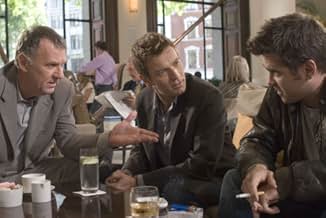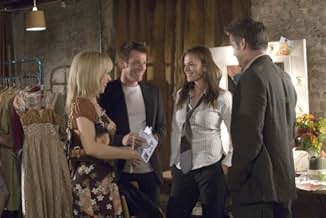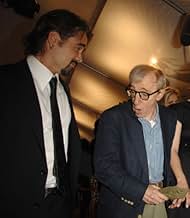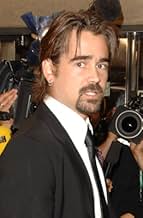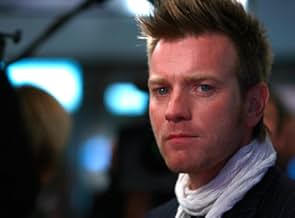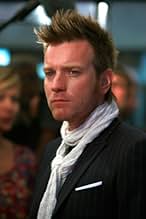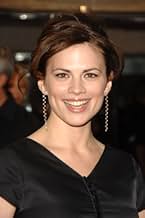VALUTAZIONE IMDb
6,6/10
54.809
LA TUA VALUTAZIONE
Due fratelli con gravi problemi finanziari. Quando una terza parte propone di passare al crimine, le cose vanno male e i due diventano nemici.Due fratelli con gravi problemi finanziari. Quando una terza parte propone di passare al crimine, le cose vanno male e i due diventano nemici.Due fratelli con gravi problemi finanziari. Quando una terza parte propone di passare al crimine, le cose vanno male e i due diventano nemici.
- Regia
- Sceneggiatura
- Star
Peter-Hugo Daly
- Boat Owner
- (as Peter Hugo-Daly)
Ashley Madekwe
- Lucy
- (as Ashley Medekwe)
Recensioni in evidenza
Woody Allen has a genius for creating fully fledged characters in minimum time. A few minutes into the opening scene which shows the two brothers buying a boat that they cannot afford, we already understand that theirs is a genuine, close and mutually supportive relationship a relationship which will be severely tested later on.
Two brothers aspiring to improve their lives in very different ways: one hoping to win enough money through gambling on dogs and poker, the other through investing in restaurants and property in Los Angeles.
Two brothers who both need money for very different reasons: one to escape the clutches of loan sharks who would break his legs, the other to escape to LA with the beautiful, sophisticated woman of his dreams.
Two brothers dealing with guilt and remorse in very different ways: one suffering ever deepening mental anguish and sleepless nights, the other pragmatically shrugging off "the past" as he ambitiously plans his future.
Shot in London, with an all British cast, the standard of acting is of the highest quality. The brothers' contrasting personalities are played to perfection by Colin Farrell and Ewan McGregor. Hayley Atwell (who like McGregor, also trained at the Guildhall School in London), would give Scarlett Johansson a run for her money as the sexy, sultry, siren, while Sally Hawkins shines as Farrell's homely, happy girlfriend.
With unremarkable, minimalist music from Philip Glass, matched by minimalist opening and closing credits, and editing which leaves-in scenes which should have been taken out, the film gives the impression that it was made in a hurry.
Yes, this is a film from a Woody Allen, who is not at his very best. However, at nearly 72 years of age and after writing and directing over 40 films, receiving 3 Oscars and over 77 other awards, his genius is surely entitled to a day off. This time it is the actors who carry the day.
Two brothers aspiring to improve their lives in very different ways: one hoping to win enough money through gambling on dogs and poker, the other through investing in restaurants and property in Los Angeles.
Two brothers who both need money for very different reasons: one to escape the clutches of loan sharks who would break his legs, the other to escape to LA with the beautiful, sophisticated woman of his dreams.
Two brothers dealing with guilt and remorse in very different ways: one suffering ever deepening mental anguish and sleepless nights, the other pragmatically shrugging off "the past" as he ambitiously plans his future.
Shot in London, with an all British cast, the standard of acting is of the highest quality. The brothers' contrasting personalities are played to perfection by Colin Farrell and Ewan McGregor. Hayley Atwell (who like McGregor, also trained at the Guildhall School in London), would give Scarlett Johansson a run for her money as the sexy, sultry, siren, while Sally Hawkins shines as Farrell's homely, happy girlfriend.
With unremarkable, minimalist music from Philip Glass, matched by minimalist opening and closing credits, and editing which leaves-in scenes which should have been taken out, the film gives the impression that it was made in a hurry.
Yes, this is a film from a Woody Allen, who is not at his very best. However, at nearly 72 years of age and after writing and directing over 40 films, receiving 3 Oscars and over 77 other awards, his genius is surely entitled to a day off. This time it is the actors who carry the day.
"Cassandra's Dream" is the final installment of Woody Allen's London trilogy and concludes his best trio of films in over 20 years.
This is a totally uncompromising film. It's all dialog, character development, and acting. Any "action" takes place off camera and although there is bloodshed, we do not see a drop of blood on screen. This is in stark contrast to recent bloodbath type movies like "No Country for Old Men," "Sweeney Todd," and "There Will Be Blood."
Unlike "Match Point," this film is not overly derivative. The acting is good and Colin Farrell gives his best performance ever. Philip Glass's score helps convey the feeling of inevitability. However, the photography is kind of dull and fuzzy.
If you like old fashioned movies that rely of story, dialog, and acting; "Cassandra's Dream" is exactly the type of movie you thought they did not make any more.
This is a totally uncompromising film. It's all dialog, character development, and acting. Any "action" takes place off camera and although there is bloodshed, we do not see a drop of blood on screen. This is in stark contrast to recent bloodbath type movies like "No Country for Old Men," "Sweeney Todd," and "There Will Be Blood."
Unlike "Match Point," this film is not overly derivative. The acting is good and Colin Farrell gives his best performance ever. Philip Glass's score helps convey the feeling of inevitability. However, the photography is kind of dull and fuzzy.
If you like old fashioned movies that rely of story, dialog, and acting; "Cassandra's Dream" is exactly the type of movie you thought they did not make any more.
An intriguing thing about Woody Allen's CASSANDRA'S DREAM is the presence of actor Phil Davis. The movie deals with a plot to kill Martin Burns, the character played by Davis. The character isn't particularly interesting and the reasons for wanting him dead remain mostly unclear, but, as Burns -- if you don't look too closely and from a distance -- Davis bears a vague resemblance to Woody: same thinning gray hair, prominent eyeglasses, gaunt face, skinny physique and taste in casual sport coats. The character gets precious little screen time and Davis gets very little opportunity to give Burns anything suggesting a personality, so the similarities are purely superficial -- but then, the resemblance CASSANDRA'S DREAM has to a Woody Allen movie is also vague and superficial.
It is, admittedly, unfair to criticize a filmmaker for not making a movie that fits neatly into a previously constructed mold, to try to do something different. And Woody has two established styles -- absurdist comedy and dark, oh-so serious melodrama. In his prolific career he has managed to run the gamut between the extremes, occasionally mixing tones, yet still creating films that have a distinctly "Woody Allen" quality. But, as was the case with the equally banal (and vastly overrated) MATCH POINT, the problem with CASSANDRA'S DREAM is that it is not only devoid of Woody's style, but of any style. As always, the film is technically proficient and slickly done, but there is a coldness, a lack of purpose behind CASSANDRA. Like many of his films, it is essentially a dramatized short story, but it lacks either his rambling, cynical sense of humor or a pointed moral that makes its serious tone have a bite. Even his tired trademark rant about the futility of life due to the absence of a benevolent god is given only slight attention.
The story is relatively simple: In London, two close, working-class brothers find themselves strapped for cash and seek to borrow money from their wealthy uncle. Uncle Howard is more than willing to oblige, but there is a catch; the boys have to earn the money by killing one of Uncle's business associates, the aforementioned Mr. Burns. From there, the story could go in two directions: a comedy of errors as the two hapless amateurs try to commit the crime or a suspenseful drama as the two get drawn deeper and deeper into a dark world that neither wants nor is prepared for. Allen takes the story in the latter direction, though unfortunately, as he has shown previously, he has no skill for creating suspense or directing scenes of violence.
CASSANDRA'S DREAM isn't a bad movie, but rather an inadequate one -- or more accurately, an incomplete one. The performances are just fine, with Ewan McGregor and Colin Farrell as the brothers, Ian and Terry, doing their best to flesh out thinly drawn characters. Indeed, the actors could easily carry the material were it not for the weakness of Allen's poorly contrived narrative. Even accepting as a given that Ian and Terry are amateurs, their plan to kill Burns is embarrassingly simple-minded and illogical: If Uncle Howard is the one most likely to want Burns dead, wouldn't his poor nephews' sudden display of unaccountable wealth seem suspiciously convenient? The story needs to be fleshed out with believable complications and should build to an ironic twist that delivers a bang and not a mere whimper.
The screenplay that Allen offers is not without its merits. The two men played by McGregor and Farrell, are basically decent blokes, but their need for money and the way Uncle Howard (Tom Wilkinson) manipulates them to go bad in the name of family loyalty pushes them to rationalize their behavior. Further, Ian is ambitious and Terry is a gambler, and Allen subtly defines Uncle Howard as an ambitious gambler in his own right. But, the story also shows that Ian and Terry have parallels to Burns as well, similarities the script would have done better to explore with much greater interest. As is, the battle between good and evil as Allen lays it out is exceedingly lame; the "we-can't-do-this / we-have-to-do-this" dialogue is not backed up -- or hyped up -- with any dramatic tension. When the boys actually meet Burns and they (and we) find him to be a nice, friendly man who seems undeserving of his fate, the dramatic tension should be kicked up a notch. We are barely allowed to care for Terry and Ian to the point where we don't want them to commit the crime, but we should certainly care as well whether their innocent victim dies. As in MATCH POINT and CRIMES AND MISDEMEANORS (and to some degree even MANHATTAN MURDER MYSTERY), Allen can't seem to muster up much interest, let alone sympathy, for the victims of the crimes he concocts. A recurring theme in so many of his films is characters who rant and rave about how unjust and cruel our supposedly godless world is, yet when Woody creates little worlds for his movies, the god he plays isn't any more compassionate or caring. What's missing -- and I know it is a tired complaint -- is Woody's sharp wit that not only blesses his best characters with the quirks and charm that make them humorous, but humane as well. When Woody defines his characters through wit, they come alive; when he defines them by their bitterness and discontent, they remain stagnant and uninteresting, and worse, largely one-dimensional. All of Woody's laborious moralizing dialogue never has as much power as one of his well constructed pieces of casual sarcasm.
It is, admittedly, unfair to criticize a filmmaker for not making a movie that fits neatly into a previously constructed mold, to try to do something different. And Woody has two established styles -- absurdist comedy and dark, oh-so serious melodrama. In his prolific career he has managed to run the gamut between the extremes, occasionally mixing tones, yet still creating films that have a distinctly "Woody Allen" quality. But, as was the case with the equally banal (and vastly overrated) MATCH POINT, the problem with CASSANDRA'S DREAM is that it is not only devoid of Woody's style, but of any style. As always, the film is technically proficient and slickly done, but there is a coldness, a lack of purpose behind CASSANDRA. Like many of his films, it is essentially a dramatized short story, but it lacks either his rambling, cynical sense of humor or a pointed moral that makes its serious tone have a bite. Even his tired trademark rant about the futility of life due to the absence of a benevolent god is given only slight attention.
The story is relatively simple: In London, two close, working-class brothers find themselves strapped for cash and seek to borrow money from their wealthy uncle. Uncle Howard is more than willing to oblige, but there is a catch; the boys have to earn the money by killing one of Uncle's business associates, the aforementioned Mr. Burns. From there, the story could go in two directions: a comedy of errors as the two hapless amateurs try to commit the crime or a suspenseful drama as the two get drawn deeper and deeper into a dark world that neither wants nor is prepared for. Allen takes the story in the latter direction, though unfortunately, as he has shown previously, he has no skill for creating suspense or directing scenes of violence.
CASSANDRA'S DREAM isn't a bad movie, but rather an inadequate one -- or more accurately, an incomplete one. The performances are just fine, with Ewan McGregor and Colin Farrell as the brothers, Ian and Terry, doing their best to flesh out thinly drawn characters. Indeed, the actors could easily carry the material were it not for the weakness of Allen's poorly contrived narrative. Even accepting as a given that Ian and Terry are amateurs, their plan to kill Burns is embarrassingly simple-minded and illogical: If Uncle Howard is the one most likely to want Burns dead, wouldn't his poor nephews' sudden display of unaccountable wealth seem suspiciously convenient? The story needs to be fleshed out with believable complications and should build to an ironic twist that delivers a bang and not a mere whimper.
The screenplay that Allen offers is not without its merits. The two men played by McGregor and Farrell, are basically decent blokes, but their need for money and the way Uncle Howard (Tom Wilkinson) manipulates them to go bad in the name of family loyalty pushes them to rationalize their behavior. Further, Ian is ambitious and Terry is a gambler, and Allen subtly defines Uncle Howard as an ambitious gambler in his own right. But, the story also shows that Ian and Terry have parallels to Burns as well, similarities the script would have done better to explore with much greater interest. As is, the battle between good and evil as Allen lays it out is exceedingly lame; the "we-can't-do-this / we-have-to-do-this" dialogue is not backed up -- or hyped up -- with any dramatic tension. When the boys actually meet Burns and they (and we) find him to be a nice, friendly man who seems undeserving of his fate, the dramatic tension should be kicked up a notch. We are barely allowed to care for Terry and Ian to the point where we don't want them to commit the crime, but we should certainly care as well whether their innocent victim dies. As in MATCH POINT and CRIMES AND MISDEMEANORS (and to some degree even MANHATTAN MURDER MYSTERY), Allen can't seem to muster up much interest, let alone sympathy, for the victims of the crimes he concocts. A recurring theme in so many of his films is characters who rant and rave about how unjust and cruel our supposedly godless world is, yet when Woody creates little worlds for his movies, the god he plays isn't any more compassionate or caring. What's missing -- and I know it is a tired complaint -- is Woody's sharp wit that not only blesses his best characters with the quirks and charm that make them humorous, but humane as well. When Woody defines his characters through wit, they come alive; when he defines them by their bitterness and discontent, they remain stagnant and uninteresting, and worse, largely one-dimensional. All of Woody's laborious moralizing dialogue never has as much power as one of his well constructed pieces of casual sarcasm.
If you loved Match Point, you will definitely love this one! The directing and story is terrific. Ferrel and McGregor do an amazing job. Don't listen to the negative reviews from people who can't enjoy a movie unless it's filled with nothing but car chases, explosions, and gun fights. This is a real down to earth story of two brothers wanting more for themselves who get caught up in bad things and everything spirals out of control. Kept my interest all the way through! Everyone in the cast was terrific and if you're a fan of Woody then you'll definitely enjoy this movie. Set in London like Match Point and has a similar tone although very different. Woody Allen at this best!!!
This is, perhaps, Woody Allen's darkest tale. No hope, no possibility of hoping. Dreaming seems so meaningless. The "I want" syndrome. Nothing will come out of it and shame on you for wanting it. Colin Farrell and Ewan McGregor are wonderful in performances without frills or shine. Strangely enough, Allen shows a bit of compassion for his characters but no respect. He seems to despise them. It is merit of the two actors that we manage to stay with them without falling in love with them without even like them very much. The ending, I felt, was a bit of a cope out. Woody got to the gates of hell but didn't venture in. He leaves to us the details of all that darkness. The film, however, bears Woody Allen's name but could have been a film by Basil Dearden or J Lee Thompson and I mean that as a compliment.
Lo sapevi?
- QuizKnowing the famous audition process of Woody Allen, in which an actor enters the room, is looked over by Allen and seconds later leaves the room, Colin Farrell entered his office, stood up, turned around and said, "That's it, right?" When Allen smiled and said yes, Farrell left the office.
- BlooperThe ashtray and the cigarette pack keep appearing and disappearing on the table when Terry is eating with his whole family in the beginning of the movie.
- Colonne sonoreTime to Undress
Written by H. Salters
Performed by General Electriks
Courtesy of Quannum Projects
I più visti
Accedi per valutare e creare un elenco di titoli salvati per ottenere consigli personalizzati
- How long is Cassandra's Dream?Powered by Alexa
Dettagli
- Data di uscita
- Paesi di origine
- Sito ufficiale
- Lingua
- Celebre anche come
- Cassandra's Dream
- Luoghi delle riprese
- Aziende produttrici
- Vedi altri crediti dell’azienda su IMDbPro
Botteghino
- Budget
- 13.000.000 £ (previsto)
- Lordo Stati Uniti e Canada
- 973.018 USD
- Fine settimana di apertura Stati Uniti e Canada
- 361.901 USD
- 20 gen 2008
- Lordo in tutto il mondo
- 22.687.639 USD
- Tempo di esecuzione1 ora 48 minuti
- Colore
- Proporzioni
- 1.85 : 1
Contribuisci a questa pagina
Suggerisci una modifica o aggiungi i contenuti mancanti

Divario superiore
By what name was Sogni e delitti (2007) officially released in India in English?
Rispondi






